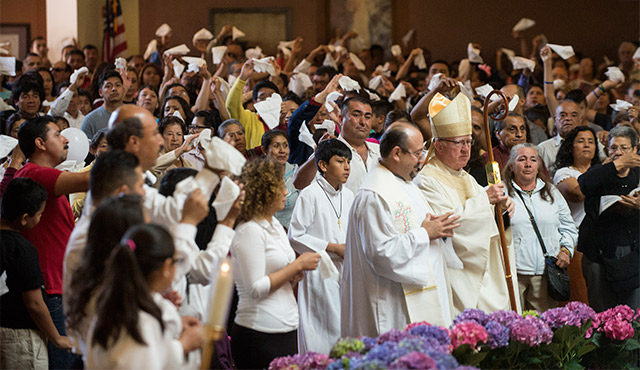If Easter had carols, one of them would probably be the “50 Days of Easter.” Thankfully it doesn’t so we don’t have to memorize all those verses up to 50 hens a-laying Easter Eggs. Instead, this year we can concentrate on this most joyous season extending from Easter Sunday, March 27, through Pentecost Sunday, May 15. It is 50 sacred days dedicated to celebrating why we are a church, why we have faith and the source of our hope.
Deacon Doug Cook of San Antonio de Padua parish in Anaheim and spiritual director of Orange County Cursillo notes that “Easter is the time we make sense out of the cross. It is the time we especially focus our thoughts on how much God loves us that he would die for us and then be raised again to redeem us.” This message is so central to our faith that the Church gives us 50 days to “celebrate” our redemption.
The first eight days of the Easter Season are called the Octave of Easter, which include Easter Sunday to the Second Sunday of Easter, or Divine Mercy Sunday. According to the United States Conference of Catholic Bishops, “it is a way of prolonging the joy of the initial day. In a sense, every day of the Octave is like a little Sunday.”
“This is the time where we say ‘yes’ to life in Christ through the resurrection,” says Father Troy Schneider, Parochial Vicar at Holy Family Cathedral in Orange. It is an intensive celebration because it, frankly, is the whole point. Without Easter and the resurrection, Jesus would not be who He said He was, the Messiah and Redeemer.
St. Pope John Paul II changed the Second Sunday of Easter in the year 2000 to Divine Mercy Sunday. The decision was based on the writings of St. Faustina, a Polish nun who passed away in 1938 at age 33. Through Vatican-approved private revelations St. Faustina was instructed by Jesus to “Tell the world about My inconceivable mercy.”
St. Pope John Paul II advocated for St. Faustina’s canonization and in response to the directive she received from Jesus, placed the recognition of Divine Mercy at the Second Sunday of Easter. Coming at the end of the Octave of Easter, it focuses our attention on God’s love and mercy for mankind. “Sister Faustina became the herald of the one message capable of off-setting the evil of those ideologies, that fact that God is mercy – the truth of the merciful Christ. And for this reason, when I was called to the See of Peter, I felt impelled to pass on those experiences of a fellow Pole that deserve a place in the treasury of the universal Church” wrote St. Pope John Paul II.
Continuing the Easter Season, the Ascension is celebrated to mark the 40 days the resurrected Christ walked among his disciples. In dioceses where it is not a holy day of obligation, the Ascension is celebrated on the Seventh Sunday of Easter. The days following the Ascension until Pentecost prepare the faithful for the coming of the Holy Spirit.
If you make the effort to delve into the 50 days of Easter and really meditate on the sweetness of the season and the great gift of salvation, perhaps you will leave the church on Pentecost Sunday feeling just like Peter did on the first Pentecost.
Then Peter stood up with the Eleven, raised his voice, and proclaimed to them, “You who are Jews, indeed all of you staying in Jerusalem. Let this be known to you, and listen to my words. These people are not drunk, as you suppose, for it is only nine o’clock in the morning. – Acts 2:14-15
If you pay attention, ‘holy intoxication,’ or being ‘drunk in the Spirit,’ could happen. Just be careful in the parking lot.

